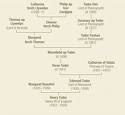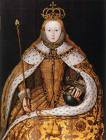
One of the lesser-known Tudor figures was Mary of Guise, a Scottish Queen and former French princess (as so many like her were). She was legendarily beautiful, initially popular, and a member of a powerful French family, and so was kind of like the Scottish Tudor equivalent of Oprah. The period in which she lived, 1515-1560, was changing rapidly. Unfortunately for her, and many other women like Anne Boleyn who got caught in the gears of that change, her initially fairy-tale story subsequently had a rough ending.
Wedding to secure an Auld Alliance--a marriage of inconvenience

The brutal life of her husband, James V, was a result of a complex interplay of alliances between family, country, and religion. All three are ways that societies have been organized, now like then, and can create many ways for people to find common ground, but more tragically, many reasons that they instead could go to war. James V tried in many ways to make peace but he also stood firm on other areas such as the persecution of protestant heretics (on the forefront of burning at stake in the Isles), that made his own life in many ways turbulent, stressful, and thus short.
One of his accomplishments during his only three decades of life was to renew the Auld Alliance between Scotland and France, approximately 1300-1600.
The reason for this alliance was natural: Scotland and France both had beefs with England. Scotland wanted protection from the more powerful and populous lower U.K because they shared a border with them,and thus like any country that would have some reasons for common ground, England and Scotland would inevitably end up in property disputes. France wanted an ally in their ongoing state of partially-declared war with England to compete with them as a world power for influence and land in the rest of Europe and the New World. Thus because shared enemies create friends in otherwise unlikely places, the two countries France and Scotland became allies against England.
When I asked a former professor if he knew about this relationship he guessed that its nature was a religious alliance. Inevitably as people search for common ground or end up with reasons to go to war, religion is involved, but at the time of the Auld Alliance, 129[something], everyone was Catholic and thus the heart of the matter was political and economic. (An aside may be that today, too, religion gets blamed for problems in current society and in the past when really it only gets dragged in later as a blame for more primary motivators of human beings' aggressive tendencies.)
So in this case there is an interaction among allies with France and Scotland, and not one of imperial conqueror/conquered like when William I brought French over in 1066. French at that time, rather than influencing the language of the conquered peoples, ended up sputtering because there is a much more complicated relationship between political leadership and the language spoken among the common people than most assume. I have frequently heard 'If [X] had happened (Germany winning WWII, fir instance) we would all be speaking German!' I am not sure that is true. When there is a foreign leadership situation the languages involved very often remain socially separate because of the social stratification and mutual animosity that naturally results. But when there is a relationship instead among equals in an alliance situation (probably never actually equal, but closer), they can possibly intermix as such and are more likely I think to influence each other linguistically.
And there were quite friendly relationships as a result of the Auld Alliance initially. Scotland's main prominence in Europe to speak of were the accolades heaped on them by France after various wars the two fought in together. To repay their thanks, Scotland gave huge amounts of territory in 1400-1500's to French nobles. Those nobles would come over to Scotland with their families and their people and live amicably as shared governors with the actual Scottish royalty, not walled up in castle outposts like the Normans had to do things to avoid violent death. There are still Scottish royalty today that are called things like 'Duke of Lorraine.' I think that is the name. I haven't actually Googled that yet to make sure my memory is serving me, about that or many other particulars because it would make me victim of TMI (too much info). As I often need to, I will edit later!
Turbulent Tudor times
And such was the steady state through the fourteenth and fifteenth centuries, a long time for things to be similar politically. Things started heating up when it got contentious, and there is more familiar history to refer to. Because one thing that England and Scotland did do cooperatively together was harbor each other's exiles and terrorists, etc, during the beginning of the reformation Scotland became a breeding ground for politically active protestants that would hope to influence the direction that Catholicism was heading in England.
Henry VIII is often said to be the first protestant King, but he really spoke out of two sides of his mouth about it. One or another of his advisers suggested using reformation stances in his Great Matter (so for practical reasons to get his divorce he spoke against the pope with charges of church greed and vices just like Luther used). But at heart he remained a devout Catholic, and to appease the Pope that he wasn't actually a heretic, as well as to keep himself (successfully, mostly) from getting invaded by the Emperor, France, and Spain, he often sent his dogs on Lutherans in his own dominion. They would flee to Scotland, where they ended up having an easier time gaining the reigns politically (just like terrorism today thrives in situations of political chaos) People like Knox would up reversing the state church there from Catholicism to Protestantism.
That threw the Auld alliance in a bit of chaos, but it just goes to show what degree it was there in the first place, for well over two hundred years at that point. That is a long time language-wise, too, and collectively, I am thinking, any influence could be pretty small to end up being significant.
Mary of Guise was the first leader in Scotland to have a majorly hard time with the changes in religion. Poor Mary, formerly only really known worldwide for her beauty, living a fairy tale life, maried to a relatively beloved Scottish King, wwas to quickly become his widow, the mother of his only legitimate royal offspring, and responsible to resume his leadership including fighting his battles (literally). That relatively pleasant fairy tale included entertaining everyone who was anyone in her palace at Hollyrood, where any fine Scottish lord would hope to go to have a glimpse of what things were like on the continent.
James V himself died near the battlefield while fighting the English who were joined by local Scottish protestant 'insurgents.' So Henry VIII in England began major sympathies with protestantism out of necessity and that sympathy was was continuing out of it. His death at age 30 is thought to have not been from an actual war wound but a nervous breakdown from the psychological stress of the situation he was in and all the complex factors of ruling at that difficult time. The day before expiring he received word that his wife Mary of Guise had delivered an infant girl (Their two infant sons had died in infancy). He died with the ominous words 'Ay, my kingdom started with a lass and will die with a lass.'
It did happen in more ways than one. To avoid having to give the regency to someone sympathetic to Protestantism, Mary, as a French Catholic, gave her one year old daughter the throne. This enabled her to be de facto ruler. She tried to keep a lid on things on the battlefield and her most important ally continued to be France. This perhaps caused a situation where French was starting to be stigmatized as the language of the ruling class, but only among half or so of the population. And I think ironically, (like different races in this country) even if there is friction, that doesn't prevent language borrowing or mimicking, and it might actually speed it up, at least among the youth.
French in Scotland--people power
Along with the nobles who had held dukedoms and earldoms, Mary relied heavily on french soldiers. During this period there was a huge immigration of them who came with their families planning not ever to return. They were probably among the most socially respected and well paid members of society other than the French nobles themselves.
As soon as she could, Mary sent her daughter to France for her protection. Henry VIII wanted to wed his son Edward VI to her and was sending armies to try to force the nuptial arrangements, called his 'rough wooing.' She decided to send Mary to France to be betrothed to Francis II of France, thus during 10 years or so the Queen of Scotland was also the Queen of France.

Mary took over a retinue of four friends called the 'Four Mary's.' (This was a pun on the three Marys from the bible). Together these women were raised in France during a linguistically sensitive period. Mary herself was there from 10 to 20, perhaps the entire period in which dialect becomes solidified. She was said to speak English with a French accent the rest of her life, which would be understandable.
And so did her friends, which were the equivalent of celebrities of their day. Her friends the Marys came back with her to Scotland when her husband Francis died. They all with their French accents became prime meat on the marriage market, and married among the best nobles who wanted, whatever their other political sympathies, to have a piece of France's existing cultural allure. This says nothing to the rest of the Marys' retinue, which must have been also considerable.
There was emigration from Scotland to France, too, but since I have no idea what if any impact of Scottish English speakers had on French there might be, (probably very little since they remained the lower status of the two groups), I will only touch on how that emigration would have impacted Scots back home. As Catholicism became increasingly persecuted, Scottish Catholic families (again, probably only the wealthy ones, the poor were forcibly converted) fled for asylum in France, where they remained until they would trickle back over the next hundred years as France itself became increasingly unstable--thus enabling a chance for French influence among the wealthy and powerful for additional centuries.
Mary Queen of Scots, daughter of James V and Mary of Guise, herself was imprisoned by Elizabeth when she was 25. But she continued to be the hope of at least about half of the Scots and whatever their political sympathizers. Whenever Scottish nobles visited England they would pay diplomatic visit to her (her imprisonment was somewhat lax, as Elizabeth knew it would be hard for a royal woman and her large household to do much of anything).
Resulting linguistic impact
Meanwhile, back in Scotland, things started to go south economically. Rightly or wrongly as the politically disaffected often do, there was a contingent that would say among the people, it was better back in the days of French rule! Now we have nothing but our own Scottish poverty!, etc. So while Protestants (Calvinists) held the regency of James and thus control, social status and cultural sympathy remained at least to some degree with Mary and the Frenchness she represented. The Guises continued to make trips over to Scotland to befriend the young James VI (later James I after Elizabeth's death), though he formally accepted the Calvinism of his regents.
This was a situation opposite of when the French had ruled under William I. Now more inborn English were ruling, and they were very unpopular. Like Henry VIII, but without the status or the fear they inspired to protect them from criticism, they destroyed the monasteries and abbeys, which for centuries had been the only places for things like weddings, funerals, or other social gatherings. They also cut off the at least outwardly lucrative aid source from France.
Like today where people resent those in power, French, which once was an accepted part of the infrastructure in Scotland, became (though it remained present and thus potentially influential) the underdog and might have garnered cultural sympathy on that basis.
Some of James VI's best friends and advisers were French when he was young, but interestingly he shunned them once his ascension sealed the unification of Scotland and England under the somewhat accepted notion that both would be Protestant. No one had any use for France after that point, and thus if Scotland had been influenced by France my guess is it would have happened within that 300 years of political relations.
And essentially the relationship between the two languages is small, small enough that shared military and nobility might be enough to explain it if there was any cumulative affect over 300 years. Vowels are interesting and unlike things like syntax or vocabulary. For languages to share vowels they don't need to have any amicable relationship, they need only have some amount of exposure because their cultures are contiguous (India and Pakistan don't share a mutually comprehensible language OR any political interests, but at the border their people interact, and thus the sounds in each language are able to spread. In fact along the border is where the similarity of vowels is strongest and diffuses deeper within each country).
One phenomenon that might be related is the tendency for cultures that have some base familiarity with one another to pick out a distinctive sound that the other makes when they are 'mocking' that other language. Koreans, to make fun of Americans, say '/sh, sh, sh, sh/' because it apparently is a distinctive feature of English speakers to them. So if someone who heard French speakers but didn't understand them was going to poke fun at their language, they might say '/eu, eu, eu/' (the unmarked vowel that French use for stuttering).
Over time however, again like the racial groups and young people in this country, something held up for criticism and mockery might actually be incorporated. This is because the greater the salience of a linguistic feature, or the more likely it is to get attention, the more likely it is to have some type of impact--and what is better at getting attention than mocking or making fun of another culture?
The biggest argument to me that this 300 year period of mutual exchange of resources between the two countries led to sharing of vowels was that among the other remnant Gaelic dialects there are quite a few similarities. But some of the things that happen to be distinctive, including some of the vowels NOT used by other Gaelic dialects, happen to be also vowels that are distinctive about French pronunciation.











No comments:
Post a Comment